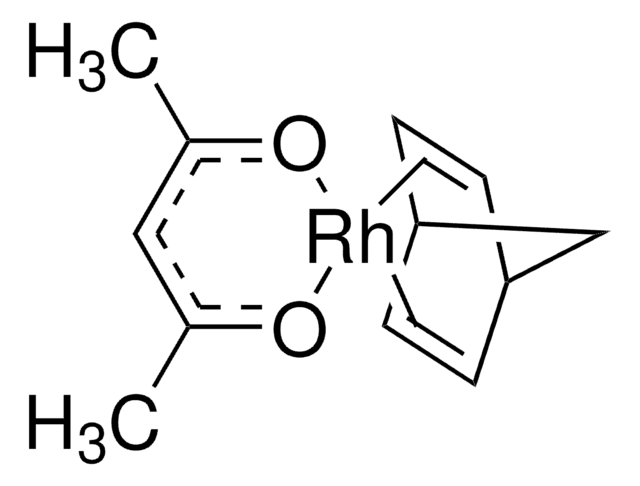282774
Rhodium(III) acetylacetonate
97%
Synonym(s):
2,4-Pentanedione rhodium(III) derivative, Rh(acac)3
About This Item
Recommended Products
Assay
97%
form
solid
reaction suitability
reagent type: catalyst
mp
263-264 °C (lit.)
SMILES string
CC(=O)\C=C(/C)O[Rh](O\C(C)=C\C(C)=O)O\C(C)=C\C(C)=O
InChI
1S/3C5H8O2.Rh/c3*1-4(6)3-5(2)7;/h3*3,6H,1-2H3;/q;;;+3/p-3/b3*4-3+;
InChI key
DGOINFUDFBWCMX-MUCWUPSWSA-K
General description
Application
- As a precursor to synthesize Rh nanocrystals with catalytic activities.
- As an efficient catalyst for the α-alkylation of ketones, β-alkylation of secondary alcohols, and the alkylation of amines with primary alcohols.
- To prepare highly phosphorescent complexes for organic light-emitting devices.
- To synthesize the Rh2P NCs supported on carbon (Rh2P/C) by a one-step solvothermal method via a direct reaction between Rh(acac)3 and tri-n-octylphosphine (TOP). The resultant electrocatalyst exhibited remarkable performance for both the hydrogen evolution reaction and the oxygen evolution reaction, surpassing the capabilities of Rh/C and Pt/C catalysts for water splitting .
- To prepare Single-atom Rh/N-doped carbon electrocatalyst for the oxidation of formic acid.
- To synthesize Pt–Rh NWs as highly efficient electrocatalysts toward ethanol oxidation reaction (EOR) for Direct ethanol fuel cells. The electrocatalyst demonstrated improved catalytic activities, primarily attributed to the presence of Rh, which enhances its ability to resist poisoning.
Signal Word
Warning
Hazard Statements
Precautionary Statements
Hazard Classifications
Acute Tox. 4 Dermal - Acute Tox. 4 Inhalation - Acute Tox. 4 Oral - Eye Irrit. 2 - Repr. 2 - Skin Irrit. 2 - STOT SE 3
Target Organs
Respiratory system
Storage Class Code
11 - Combustible Solids
WGK
WGK 3
Flash Point(F)
Not applicable
Flash Point(C)
Not applicable
Personal Protective Equipment
Certificates of Analysis (COA)
Search for Certificates of Analysis (COA) by entering the products Lot/Batch Number. Lot and Batch Numbers can be found on a product’s label following the words ‘Lot’ or ‘Batch’.
Already Own This Product?
Find documentation for the products that you have recently purchased in the Document Library.
Customers Also Viewed
Our team of scientists has experience in all areas of research including Life Science, Material Science, Chemical Synthesis, Chromatography, Analytical and many others.
Contact Technical Service















